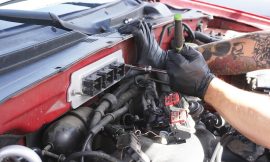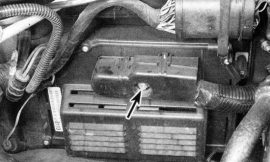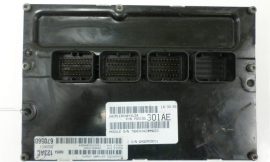Last updated on December 26th, 2023 at 12:23 pm
The Engine Control Unit (ECU) is a vital component in modern vehicles, playing a pivotal role in enhancing vehicle performance and efficiency. This critical element dictates the functioning of the car’s engine, ensuring optimal performance and fuel usage.
What is an ECU?
An Engine Control Unit, or ECU, is essentially the vehicle’s brain, commanding its engine based on data the ECU receives from the vehicle’s sensors. The concept of an ECU dates back to the 1970s, fueled by the necessity for fuel efficiency and emission control. Since then, the evolution of ECUs in the automotive industry has been significant, transforming them into technologically advanced units capable of optimizing various engine parameters for improved vehicle performance.
Core Functions of an ECU
Engine Management
The ECU’s engine management responsibilities are vast, encompassing the control of fuel injection, ignition timing, and idle speed. In terms of fuel injection, the ECU calculates the exact amount of fuel to be delivered into the engine’s combustion chambers based on data from various sensors. Additionally, it determines the precise moment for ignition to ensure optimal combustion, while managing idle speed to maintain engine stability when the vehicle is at rest.
Emission Control
Beyond performance optimization, the ECU also plays a crucial role in reducing vehicle emissions to meet environmental regulatory standards. It carefully monitors the engine’s emission levels, adjusting factors like fuel injection quantity and timing to lower harmful emissions. By doing this, the ECU not only ensures the vehicle’s compliance with environmental regulations, but also contributes to a cleaner environment.
Ensuring Efficiency
When it comes to enhancing efficiency, the ECU is the vehicle’s key player. Through continuous monitoring and adjusting of engine parameters, the ECU ensures the optimal balance between fuel economy and performance. Whether the car is accelerating on a freeway or slowly navigating a city street, the ECU makes real-time adjustments to maximize efficiency and performance, offering drivers a smoother and more economical driving experience.
Advanced Features Enabled by the ECU
Diagnostic Functions
One of the ECU’s pivotal characteristics is its diagnostic capabilities. Modern vehicles are equipped with Onboard Diagnostics (OBD), an advanced system that enables the ECU to continually monitor vehicle performance and detect any potential issues. If the system identifies an irregularity, it triggers an error code that can be read with specialized diagnostic tools. This preemptive detection allows for prompt rectification, preventing further damage and ensuring the vehicle stays in prime condition.
Adaptive Learning
The ECU also exhibits the ability for adaptive learning, a feature that enables it to adjust to different driving styles and environmental conditions. Over time, the ECU learns from the data it collects, altering its commands to optimize engine performance according to the driver’s habits and the surrounding environment. For instance, if the driver frequently accelerates abruptly, the ECU will respond by adjusting fuel injection and ignition timing to maintain engine stability and efficiency.
Integration with Other Systems
Moreover, the ECU integrates seamlessly with other vehicle systems, such as the transmission control and Anti-lock Braking System (ABS). In conjunction with the transmission control, the ECU ensures smooth gear changes and optimal engine speed. Simultaneously, it communicates with the ABS to balance braking and engine power, ensuring safe and effective vehicle control during sudden braking situations. This coordinated interaction between various systems demonstrates the ECU’s integral role in harmonizing vehicle operations for an enhanced driving experience.
Common Issues and Diagnostics
Just like any other component of a vehicle, the ECU can also run into a range of problems that can significantly affect vehicle performance. Some of the common ECU-related issues include irregular engine performance, poor fuel efficiency, and failure to start the engine.
Irregular Engine Performance
If your vehicle experiences unexplained surges in speed, stalling, or inconsistent power, it could be a sign of an ECU problem. These irregularities occur when the ECU fails to correctly interpret or respond to data from the vehicle’s sensors, leading to erratic engine behavior.
Poor Fuel Efficiency
The ECU plays a significant role in optimizing fuel efficiency. If you are getting fewer miles per gallon than usual, it could indicate an issue with the ECU. This is because the ECU could be failing in its duty to adjust fuel injection and ignition timing for optimal combustion and fuel economy.
Engine Start Failure
A failing ECU can also prevent the engine from starting. If all other components and systems are in good working condition and the engine still cannot start, it might be a clear sign of ECU failure.
Diagnostic Tools and Methods
Fortunately, there are several tools and methods available to diagnose ECU problems.
OBD Scanners
OBD scanners are the most common diagnostic tools used. When connected to the vehicle, these scanners can read error codes generated by the ECU. These codes can then be interpreted to identify the specific component or system causing the issue.

ECU Testing
ECU testing involves checking the unit for faults using specialized equipment. This often needs to be done by professional mechanics, but there are also DIY kits available for those with technical knowledge.
Software Diagnostics
Software diagnostics can be employed to analyze the data collected by the ECU. This can identify any anomalies in the data that can pinpoint potential problems.
Dealing with ECU problems can seem daunting, but with the right knowledge and tools, these issues can be identified and resolved promptly. Remember to consult a professional if you are unsure about diagnosing or fixing any vehicle problems.
Maintenance and Care for Your ECU
Proper maintenance and care of your Engine Control Unit (ECU) are critical to ensure your vehicle’s optimal performance and longevity. It is not enough to simply address issues as they arise; preventative measures are equally important.
Regular Inspections
One of the best practices for ECU health is regular inspection. Regular check-ups can prevent potential issues from escalating, ensuring that your ECU continues to function efficiently. These inspections often involve analyzing the ECU’s data output and checking for error codes.
Keep Software Up-to-Date
ECUs, like any other computer system, require occasional software updates. Ensure your ECU’s software is always up-to-date to benefit from the latest enhancements and bug fixes. Software updates can often lead to improved vehicle performance and efficiency.
Maintain a Clean Engine
A clean engine can significantly impact the ECU’s performance. Ensure your vehicle’s engine is free from dust, dirt, and grime, which can interfere with the ECU’s operation and cause inaccurate sensor readings.
Avoid Moisture Exposure
The ECU, being an electronic device, is susceptible to damage from moisture. To protect your ECU, make sure it is properly sealed and avoid exposing your vehicle to excessive moisture.
When to Seek Professional Help
While regular maintenance can significantly reduce the likelihood of ECU issues, sometimes professional help may be necessary. If you notice unusual vehicle behavior such as irregular engine performance, reduced fuel efficiency, or engine start failures, it is advisable to consult a professional mechanic. They are equipped with advanced diagnostic tools and possess the required expertise to accurately identify and resolve ECU-related issues.
Remember, understanding and addressing ECU problems promptly is vital for your vehicle’s optimal performance and longevity. Do not hesitate to seek professional help when in doubt. Your vehicle’s health and your safety are paramount.
Upgrades and Modifications: Overview of ECU Tuning and Aftermarket Modifications
ECU tuning and aftermarket modifications are often sought by car enthusiasts seeking enhanced performance and vehicle customization. ECU tuning involves modifying the software controlling your engine to increase horsepower, torque, or fuel efficiency.

Benefits of Modifying the ECU
One of the main benefits of ECU tuning is enhanced performance. By optimizing the fuel/air mix, ignition timing, or boost pressure, ECU tuning can unlock additional horsepower and torque that the manufacturer might have restrained to meet emission standards or fuel economy targets.
Another potential benefit is improved fuel efficiency. By fine-tuning the engine’s parameters, you can achieve a more efficient combustion process, which could lead to better fuel economy, especially if your driving habits are consistent and predictable.
Risks of Modifying the ECU
While ECU modifications can enhance performance and efficiency, they are not without risks. Modifying the ECU can void your vehicle’s warranty, as manufacturers often do not cover engine failures or defects caused by unauthorized modifications.
Additionally, ECU tuning requires technical expertise; incorrect modifications can lead to serious engine damage. Over-tuning can strain the engine, leading to overheating, excessive wear, and even catastrophic engine failure. Therefore, it’s crucial to work with a reputable professional when considering ECU modifications.
The Future of ECUs in Automotive Technology
As we move into the future, ECUs or Engine Control Units are anticipated to play an even more substantial role in automotive technology. Emerging trends indicate a shift towards more advanced, integrated, and versatile ECUs, capable of managing increasingly complex vehicle systems.
ECUs and Electric Vehicles
In electric vehicles (EVs), ECUs are expected to take on a broader spectrum of responsibilities. Apart from controlling the traditional components of a vehicle, ECUs in electric vehicles will be tasked with managing the electric powertrain. This includes monitoring battery performance, regulating energy flow, and handling charging procedures.
Autonomous Vehicles and ECUs
The advent of autonomous vehicles presents another frontier where ECUs will play a pivotal role. As vehicles become more autonomous, ECUs will need to process vast amounts of data from various sensors and make complex decisions in real-time. They will have to interpret inputs from LIDAR, radar, and cameras to navigate the vehicle safely and efficiently.
Emerging trends in ECU Technology
As ECUs become more advanced, we are likely to see a trend towards more centralized computing systems in vehicles, as opposed to several separate ECUs. This can lead to more efficient data processing and easier software updates. Moreover, with the rise of AI and Machine Learning, ECUs will evolve to be more intelligent, capable of learning and adapting to changing conditions.
The future of ECU technology promises to be exciting, with significant advancements set to revolutionize automotive technology. As these changes unfold, it will be crucial for vehicle owners and professionals alike to stay informed and adapt to keep pace with this rapidly evolving field.
In conclusion, the Engine Control Unit (ECU) serves as the brain of modern vehicles, regulating a plethora of operations and systems to ensure optimal performance, efficiency, and safety. From managing the engine’s fuel mixture to controlling emission systems, and even playing a significant role in emerging technologies like electric and autonomous vehicles, the ECU’s importance cannot be overstated. As a vehicle owner, having a fundamental understanding of the ECU and its functions is imperative. Regular maintenance checks, software updates, and appropriate care can greatly enhance the longevity and performance of your vehicle. With the rapidly progressing landscape of automotive technology, staying informed and proactive in the upkeep of your ECU is not just a recommendation but a requirement for ensuring the health of your vehicle. Remember, your vehicle’s performance mirrors the care you put into it.


















